| Article ID | Journal | Published Year | Pages | File Type |
|---|---|---|---|---|
| 5550260 | International Journal of Pharmaceutics | 2017 | 12 Pages |
Studies have shown that nanoparticles (NPs) are cleared through the mononuclear phagocyte system (MPS). Pharmacokinetic studies of Doxil, DaunoXome, micellar doxorubicin (SP1049C) and small molecule (SM) doxorubicin were performed in SCID mice, Sprague-Dawley rats, and beagle dogs. An ex vivo MPS profiling platform was used to evaluate the interaction between the same agents, as well as colloid-forming and non-colloid forming SM drugs. In all species, the systemic clearance was highest for SP1049C and lowest for Doxil. With the exception of dog blood, the MPS screening results of mouse and rat blood showed that the greatest reduction in phagocytosis occurred after the ex vivo addition of SM-doxorubicin > SP1049C > DaunoXome > Doxil. The MPS profiling platform in rats, but not dogs, could differentiate between colloid forming and non-colloid forming drugs. The results of the MPS profiling platform were generally consistent with in vivo clearance rates of NP and SM anticancer drugs in mice and rats. This study suggests the MPS profiling platform is an effective method to screen and differentiate the important characteristics of NPs and colloid-forming drugs that affect their in vivo clearance. Implications of these findings on preclinical prediction of human clearance are discussed.
Graphical abstractDownload high-res image (137KB)Download full-size image
